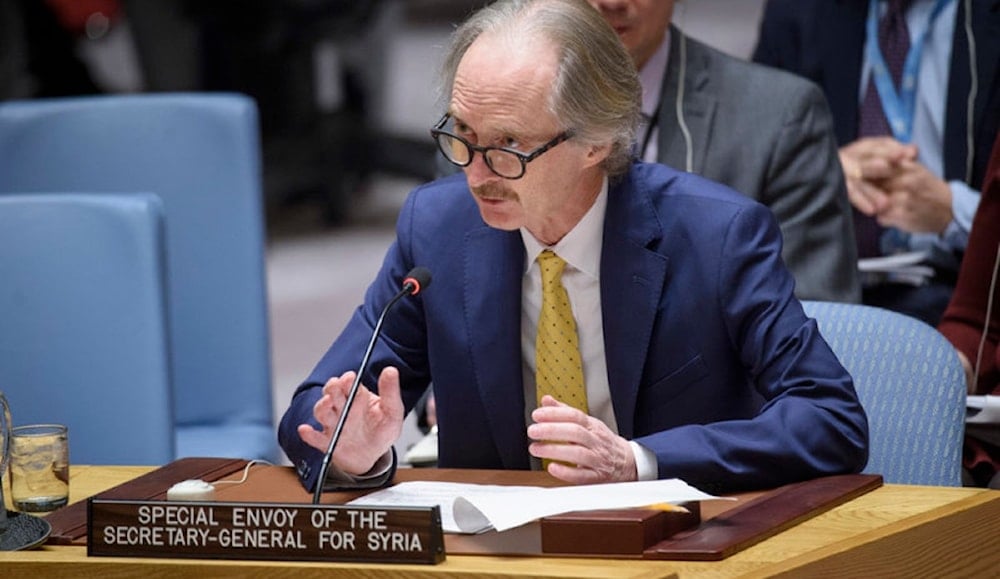UN Syria Envoy: Millions of Syrians seek transitional arrangements
The United Nations' Special Envoy for Syria, Geir Pedersen, urges Syrians to prioritize dialogue, unity, and respect for international humanitarian law and human rights in their efforts to "rebuild the country".
-

Geir O. Pedersen, Special Envoy for Syria, briefs the Security Council on the situation in the Middle East (Syria) in 2019 (UN)
The United Nations' Special Envoy for Syria, Geir Pedersen, emphasized the widespread demand from millions of Syrians for the establishment of stable and inclusive transitional arrangements, as stated in a declaration released on Sunday.
Pedersen called on all Syrians to focus on dialogue, unity, and adherence to international humanitarian law and human rights as they work to "rebuild their nation."
He reaffirmed his commitment to supporting the Syrian people in their efforts to achieve a stable and inclusive future.
Earlier this month, Pedersen said he was ready to broker new and comprehensive peace talks between Syrian and international stakeholders, amid the reactivation of the armed groups in the country.
"I call for urgent and serious political engagement – among Syrian and international stakeholders - to spare bloodshed and focus on a political solution in accordance with Security Council resolution 2254 (2015)," Pedersen said in a statement, affirming his readiness to employ his offices to hold meetings including all relevant stakeholders for peace talks.
At the time, he also noted a "dramatic shift in frontlines" over the previous days. He further remarked the significant dangers posed to civilians, as well as the impact on regional and international peace and stability.
"As an immediate priority, I strongly emphasize the urgent need for all to uphold their obligations under international law to protect civilians and civilian infrastructure," he said, confirming that he would continue efforts toward de-escalation and the protection of civilians.
Militants enter Damascus, PM says ready for turnover process
Syrian Prime Minister Mohammad Ghazi al-Jalali said he is ready to cooperate with any leadership chosen by the Syrian people and affirmed that he is prepared to undertake a handover process, early on Sunday.
This comes shortly after militants entered Syria's capital, Damascus, and reports of President Bashar al-Assad's leaving the capital to an unknown location at an earlier time.
Late on Saturday, the Syrian Arab Army withdrew from the city of Homs, where militants took over the city and other towns in western Syria. For the most part, no clashes were recorded before and during the withdrawal of Syrian Arab Army forces and the eventual takeover by militants of Syrian towns.
Meanwhile, al-Jalali said that he is ready to cooperate with any leadership chosen by the Syrian people, stressing that he will not leave his home until a "peaceful transition" is achieved, where he would have guaranteed the safety of Syrian public institutions and their continued work.
He urged all parties to think "rationally," adding that he extends his hand in cooperation to everyone, including members of the opposition.
It is worth noting that the onslaught on Syrian cities and towns, led by Hayat Tahrir al-Sham (HTS) and Turkish-backed militants, began on November 27, targeting the city of Aleppo in the north. Later, militants took over the city of Hama then Homs, before heading toward Damascus.
The leader of HTS, a United Nations-listed terror organization, Abu Mohammad al-Jolani released a statement instructing militants in Damascus that "it is strictly forbidden to approach public institutions, which will remain under the supervision of the former prime minister until they are officially handed over."
Read more: Syrian Army repositions forces, armed groups take over Homs

 3 Min Read
3 Min Read








